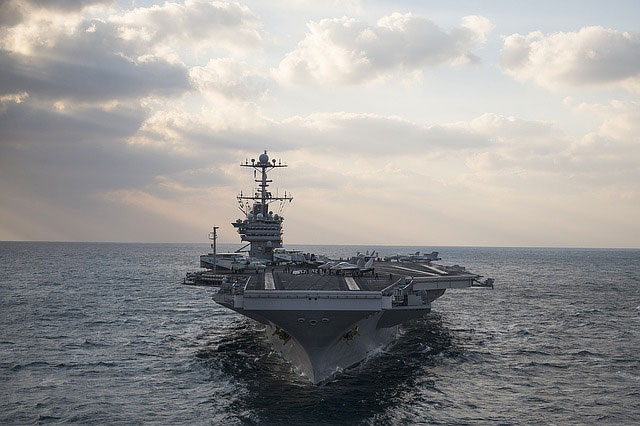In his book Destined for War, Harvard political scientist Graham Allison explains how lessons from a 5th century BC historian, Thucydides, forewarn us about the single biggest geopolitical risk of our era – that of a shifting global balance of power. Graham uses the term Thucydides Trap to describe a predictable conflict between the United States and the People’s Republic of China. He believes that, as China challenges America’s predominance on the world stage, suspicions about the opposing party’s actions and intentions will unavoidably lead to rising tensions, and potentially, a deadly military confrontation.
Graham Allison – an American political scientist and the Douglas Dillon Professor of Government at the John F. Kennedy School of Government at Harvard University. In his book Destined for War, Graham uses the term Thucydides Trap, which refers to the theory that, “when a rising power threatens to displace a ruling power, war is almost always the result.”
Thucydides Trap – Power Dynamic Between Rising And Ruling Powers
More than 2,400 years ago Thucydides, author of the History of the Peloponnesian War, offered a powerful insight. “It was the rise of Athens, and the fear that this inspired in Sparta, that made war inevitable.” Thucydides identified the structural conditions that caused a disruption in the balance of power between the rivals. One that inevitably led the Greek states into conflict. In particular, he identified the two key drivers in this destabilization. The first was the rising power’s growing entitlement, sense of importance, and demand for greater influence. The second was the established power’s fear, insecurity, and determination to defend the status quo.
In the History of the Peloponnesian War, Thucydides wrote about Athens’s emergence as a bastion of civilization, achieving advances in philosophy, history, drama, architecture, democracy, and naval dominance. This alarmed Sparta, which for a century had been the leading land power on the Peloponnese peninsula. According to Thucydides, Athens’s changing attitude was predictable. As its influence grew, so too did its self-confidence, its awareness of past injustices, its sensitivity to Sparta’s disrespect, and its assertion that previous treaties be revised to reflect new realities of power. It was also unsurprising, Thucydides argued, that Sparta interpreted the prevailing Athenian posture as unreasonable, insolent, and threatening to the system it had previously established.
Another important takeaway we learn from Thucydides, is that even though the two dominant powers – Athens and Sparta – were sensible enough not to engage each other directly, they inevitably got drug into a conflict regardless. When a dispute broke out between second-tier allied states, Sparta and Athens inescapably found themselves on opposing sides of a military escalation. The Peloponnesian War followed. And when the 27 year war finally ended, Sparta was the nominal victor, though all participants were considerably weakened.
Further Lessons From Past
 When a rising power threatens to displace a ruling one, the most likely outcome is war. According to Graham Allison, twelve of sixteen cases in which this occurred in the past 500 years ended violently. World War I offers one of the most recent and sobering reminders of the dangers of Thucydides Trap. Despite the rapid ascension of Germany’s economic and military might, one that posed an existential threat to her neighbors, even in 1914 few could imagine a global conflict, let alone a slaughter on such an incredible scale. In essence, despite all the tell-tale signs of Thucydides Trap, there was widespread complacency. Everyone thought that cooler heads would prevail and a conflict could be avoided. And like in the Peloponnesian War, the major powers didn’t instigate the hostilities directly, but were drug into the war by a domino-effect of entangled alliances. And when war ended four years later, Europe lay in ruins, the Kaiser was gone, the Russian Czar was overthrown, the Austro-Hungarian and Ottoman Empires were dissolved, and a destabilized European society laid the groundwork for yet another conflict.
When a rising power threatens to displace a ruling one, the most likely outcome is war. According to Graham Allison, twelve of sixteen cases in which this occurred in the past 500 years ended violently. World War I offers one of the most recent and sobering reminders of the dangers of Thucydides Trap. Despite the rapid ascension of Germany’s economic and military might, one that posed an existential threat to her neighbors, even in 1914 few could imagine a global conflict, let alone a slaughter on such an incredible scale. In essence, despite all the tell-tale signs of Thucydides Trap, there was widespread complacency. Everyone thought that cooler heads would prevail and a conflict could be avoided. And like in the Peloponnesian War, the major powers didn’t instigate the hostilities directly, but were drug into the war by a domino-effect of entangled alliances. And when war ended four years later, Europe lay in ruins, the Kaiser was gone, the Russian Czar was overthrown, the Austro-Hungarian and Ottoman Empires were dissolved, and a destabilized European society laid the groundwork for yet another conflict.
China’s Ascension
Taking lessons from Thucydides, its important that we identify the biggest threat to world peace and stability. The preeminent geopolitical risk of this era isn’t violent Islamic extremists or a resurgence of Russia. It is the impact that China’s rise is having on the US-led international order – one that has been in place for the past 70 years.
Prior to the initiation of economic reforms and trade liberalization nearly 40 years ago, China maintained policies that kept its economy centrally controlled, largely inefficient, stagnant, poor, and relatively isolated from the global economy. Since opening up to foreign trade and investment and implementing free-market reforms in 1979, China has been among the world’s fastest-growing economies. Real annual gross domestic product (GDP) growth averaged 9.5% through 2018, a pace described by the World Bank as “the fastest sustained expansion by a major economy in history.” Such growth has enabled China, on average, to double its GDP every eight years and helped raise an estimated 800 million people out of poverty. Today, China has displaced the United States as the world’s largest economy measured in terms of the amount of goods and services a citizen can buy in their own country (purchasing power parity). China has also become the world’s largest manufacturer, merchandise trader, and holder of foreign exchange reserves. As Singapore’s first Prime Minister, Lee Kuan Yew, insightfully stated, “the size of China’s displacement of the world balance is such that the world must find a new balance. It is not possible to pretend that this is just another big player. This is the biggest player in the history of the world.”
Escalation In Tensions Between The US And China
The profound question concerning global stability, peace and prosperity early in the 21st century is whether China and the United States can escape Thucydides Trap. While improbable, its not impossible. In four of the sixteen cases, including the Cold War between the United States and the Soviet Union, clever diplomacy, the threat of mutual destruction, and a little bit of luck averted war. Of course, the Cold War took place during a period of relative strength and stability in the US – both economically and politically. Present-day America is a different story. The economy, bogged down by enormous debt, is experiencing sluggish growth. And American democracy is exhibiting worrisome symptoms: declining civic engagement, institutionalized corruption, and widespread lack of trust in politics. Unfortunately, if history is a guide, political leaders will undoubtedly look beyond their own borders to find distractions from domestic strife.
One only has to look at the daily news. China-US tensions are on the rise. There is an escalating trade war, an arms buildup (particularly in the East and South China Seas), plus accusations – on both sides – of cyber-attacks and surveillance operations.
Stocks That Will Benefit From Escalating US-China Tensions
Will Washington and Beijing follow in the tragic footsteps of Britain and Germany a century ago? Or will they find a way to avoid direct military confrontation, as did the US and Soviet Union during the Cold War? Thucydides’s Trap teaches us that more times than not, war is the unfortunate outcome.
But even if war is avoidable, military buildup is a given. What started out as currency war, and led to a trade war, has clearly escalated into the early stages of a new arms race. Both the US and China are ramping up military spending in an attempt to outdo the other in state-of-the-art technologies and strategic weapons systems. And like it or not, American and Chinese defense spending will continue to rise – if not accelerate – in the coming decades.
Below we’ve listed 8 solid defense stocks that can help hedge one’s portfolio against volatility in the global markets. While uncertainties today abound, one relatively safe bet for the foreseeable future, is heightened US-China tensions and sustained military spending.





